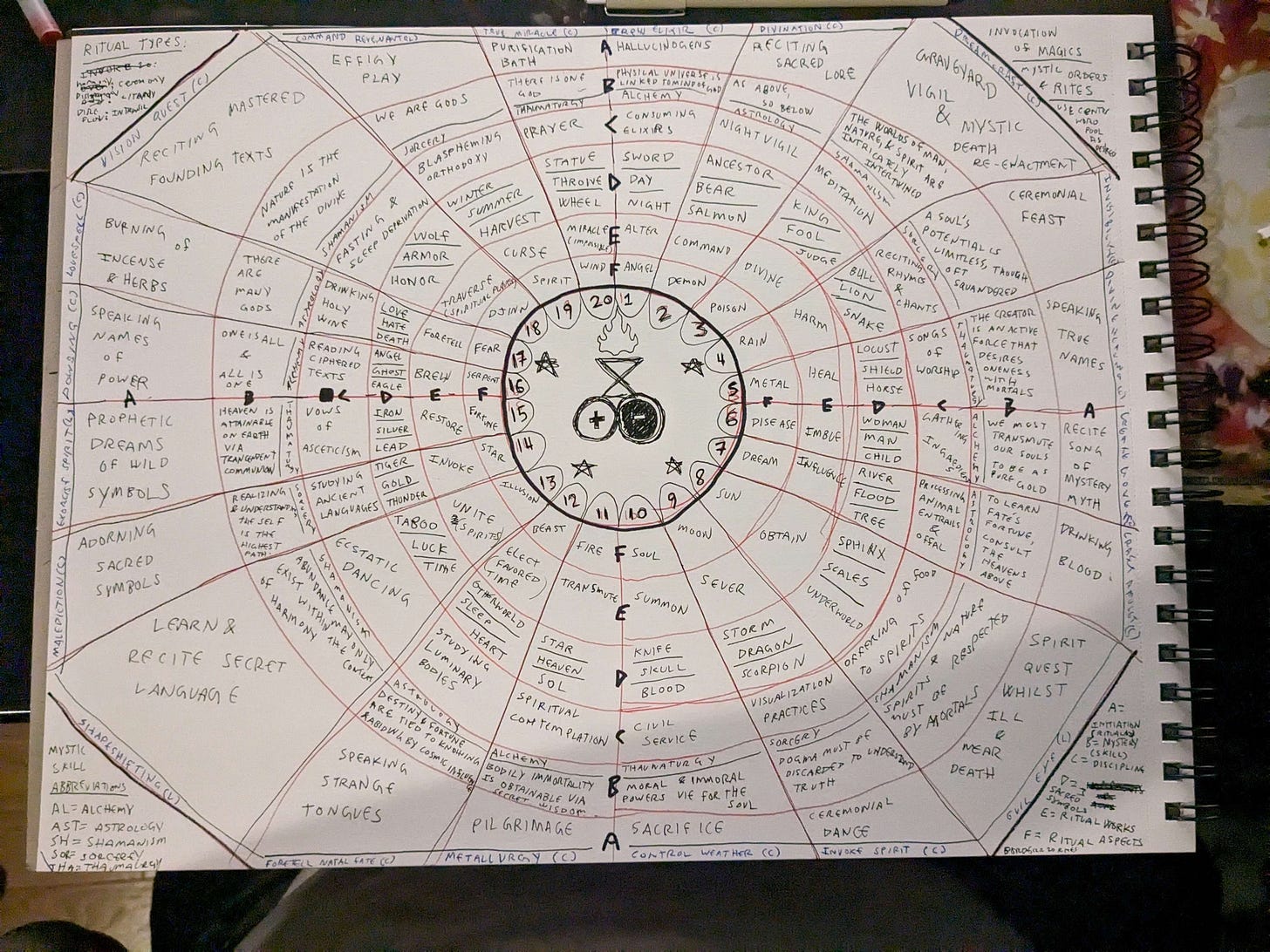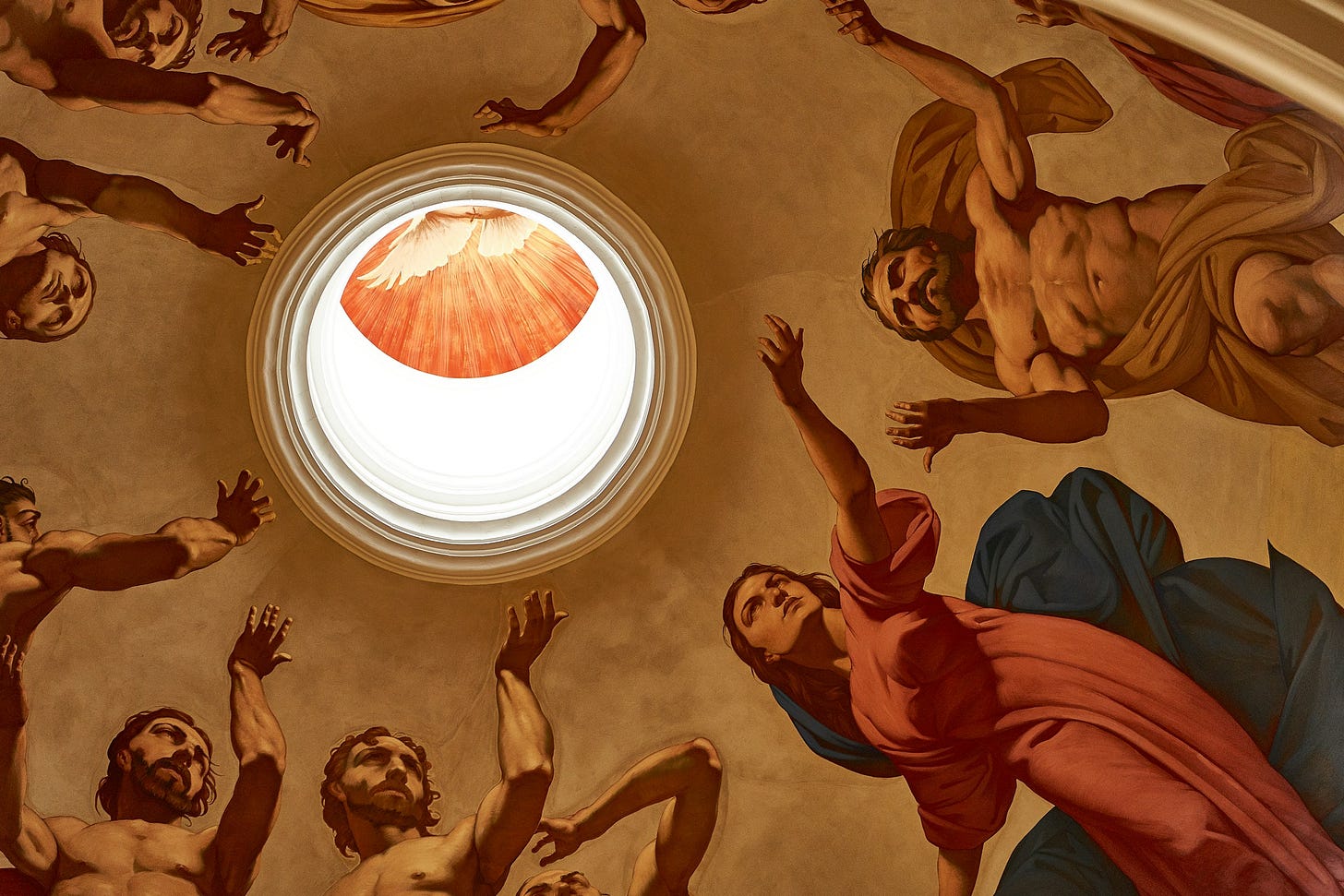Hello my friends!
Bet you didn’t see this coming!
Welcome to the FREE Keys to the Kingdom Game Design “Masterclass”, presented by yours truly, Drew Cochran.
What are we doing here?
In however many articles (we’re going to try and shoot for 20), I’m going to share with you all of the RPG secrets I’ve learned over the past 10+ years of being an ultra niche nerd writer guy!
The term “Masterclass” is used strictly tongue-in-cheek. I’m a fool trying to fail forwards, and everything I share here is largely what I’ve learned from everything I’ve done wrong & seen others do right!
Who am I & Why should you listen to me?
Hey my name’s Drew Cochran, and I’ve been addicted to the medium of imagination throughout my whole life.
As a kid on the playground, I couldn’t cease visualizing all the random scenarios playing imagination with my buddies. In middle school, we learned about tabletop roleplaying games, and haven’t been able to give them up since!
Since 2018, I’ve run 5 RPG Kickstarters that were each somehow successfully funded and (eventually) delivered!
Furthermore, I’m also what you might call an RPG Heretic.
I’ve made my own diceless RPG system, The Epic of Dreams RPG, from the ground up that one could say tries to “reinvent the wheel circle”, in more ways than one. I’ve worked on this system for nearly 10 years, on and off since early 2014 (even then, I’ve had these same weird design goals since middle school).
Because of this, our weird little symbol RPG has a lot of value to break down and analyze for the purpose of game design. There’s a lot to contrast in it vs some more foundational systems, a la Dungeons and Dragons, Vampire: The Masquerade, Traveller, GURPS, etc.
This is not the first and will not be the last article series written about game design, but it will be a very fun and intense ride, because, for whatever reason, you’ve chosen to listen to me rant about this topic from my eccentric POV for at least this long - and you bet your buttered biscuits this will only get more unhinged as we go along...
What are you going to learn?
I’m going to teach you every single thing I’ve learned about game design from the approach of a DIY indie bleeding-heart artist who has for about 10 years and continues to shove an immense amount of time, effort, and resources exploring the realms of mythology, religious studies, and game design.
However, each of these articles won’t just be about game design.
As you’ll soon come to learn, I cannot stop talking about all the invisible strings attached to “having a cool idea for an RPG” - the slippery pipeline from TTRPG enthusiast to TTRPG independent publisher, and all the crushing realities of chasing that “dungeon dragon”…
The Keys to the Kingdom is also the name of our upcoming free basic rules set. But it’s not just going to be a slapped together freebie ashcan PDF…
I’m building this zine up to be the only rules set you’ll ever need.
This will be the best production I’ve ever had the privilege to produce, and we’re giving it away for free. These are the crown jewels of my soul.
Through this presentation, you’ll also gain hella spoilers and free content from The Epic of Dreams: Basilisk Edition, and The Epic of Dreams: Keys to the Kingdom.
What will the articles be about?
The first ten articles will be centered on an aspect of game design that corresponds with our 10 Rules Icons from Keys to the Kingdom.
The way the book is structured also fits nicely with the basic steps one should take when approaching making an RPG (everything’s already ‘in order’).
In each article, you’ll learn the concept, mechanics, and design choices on the rules of The Epic of Dreams, as well as foundational principles and concepts we used to make them.
In the following articles 11 & beyond, we’ll talk about other aspects game design, and about the logistics of running an RPG business that are in our opinion, crucial for survival.
Listed, they are!
Pinnacle Design Goals
Elegance & The Language of Lore
Reinventing the Wheel: Core Mechanics & The Circle of the Muse
The Orders: Communicating Heuristics
The Crowns of Fate: Informing Player Goals
The Circles of Magic: Evergreen Engines & Redundant Elegance
The Circle of War: The All-Consuming Combat Simulator
GM Facing Systems: The Faces of the Muse
Equipping & Championing The Referee: Cornerstones of Sagacraft
Presenting Conflicts: The Living Beast
The Worthlessness of Game Design & The Supremacy of Storytelling (Marketing)
How To Ruin Your Heartbreaker Kickstarter
Why are you doing this?
I’m a poet; a glutton for pain and torture. That’s why I’m still in game design!
This process also forces me to talk about my game, which helps me become a better presenter of my ideas, which I hope you find helpful to you!
I also want to share more of the deeper aspects about our weirdo symbol RPG with you all in more detail without a paywall!
I’m also trying to put out more content and writing overall, and having a schedule like this that’s tied to our upcoming free release will help me strengthen my work muscles.
Sharing this with you REALLY helps me!
What is an Roleplaying Game?
It’s a conversation.
It’s an invisible universe that lives in your head (and hopefully, your friends). it is playing make believe, believing in monsters and faeries as when you were a child, given a sincere and focused approach, as a mature aesthetic pursuit.
It’s an assemblage of communicated principles, prompts, procedures, and fun fiddly bits that when combined together create a space where dynamic imagined “stories” can live.
An Amazonia of imagination and possibility.
The Fundamentals BEFORE the Basics
As a millennial who lives and breathes internet addiction, I need to speak to you about delayed gratification and the pursuit of the process.
The Fundamentals:
Homework
Networking
Presenting
Posting
Whenever I approach a creative medium, project, etc. I always try to do so “trembling”.
The reason I create is to try and bring wonder and divine enchantment back to a modern world filled with panic, cynicism, and material despair. This is the raison d’etre of my entire life. To create true art that’s worth someone’s time and attention, that will have real aesthetic value, that might even transform their outlook on their own life, that they may experience transcendence.
RPG’s was never supposed to be my main thing. For me, the writing of mythology and epic poetry has been my shackle, my burden to carry. I have written little epic verse in the past 5-10 years during this tangential pursuit, and have so much more planned to write in that realm.
The reason why I am here now is because I view this medium as a terrific echo of what epic poetry once was.
Ritualized group storytelling, reciting sacred legends of gods and heroes and monsters. It was pure magic that you experienced in a connected setting that gave the entire world a sense of meaning.
The stories told in this medium would end up affecting all of world history, leaving human leaders of successive generations almost spellbound; cursed to repeat what the songs declared.
Alexander grew up with the Iliad on his bed and made the entire known world his Troy. The repercussions of his short-lived empire altered the course of the Western world in ways we still cannot quantify.
I do not desire power. I desire communion. I want you to experience THE MOST .
I want to inspire the Alexander in you to become all that you can be, and experience the fullness of all that should be yours. As anyone who has read The Epic of Dreams knows, every Heroes’ greatness is theirs to transmute into ruin or paradise.
And for this pursuit, I have read much mythology, though I have not read enough. With each Saga I’ve had the privilege to run, I write with my spoken words, and my soul learns wisdom from the 24 elders and the cloud of witnesses.
This pursuit is my tangled way of paying the price to perfecting the argument of my hubris; to one day write something worthy to be compared with the names of Dante, Spenser, and Milton (but even if I don’t, I’ll be fine).
Writers never win. They do not brush off the curse of the call. They are awkwardly placed into a material reality of churning demands, while also constantly try to quench the burning flames of the Muse’s torment.
And what’s on the other side? When you “make it”?
You don’t get to stay there, necessarily. Fame is fleeting vanity. There’s never enough money.
The only thing you can really do is approach your creative desire, trembling.
Sober enough to know you’re walking into your own grave.
That nothing will become of any of this save your own integrity to your bardic soul.
That in paying the price of neglecting all other pursuits of health, balance, wealth, love, family, ministry, in the wasting of your fleeting years, that you finished what you started, and you sung the song in full, with the skill and cultivation that the enterprise demands - TREMBLING.
You have to love that abyss, where only you and your work exist.
You must become that ouroboros, who feeds itself the substance of itself, needing nothing else from no one, ecstatically fulfilled in your self expression.
And then, when your trembling soul has been found and weighed by the iron wheel in the sky, you find yourself suddenly at sea, sailing through what feels like endless storms, commanding a humble ship named Opportunity.
Homework
This tirade is all to say:
You need to read RPG books. You need to sit down and read so many of them, systems of so many different styles. Especially if you haven’t ever done it.
This hobby in its modern iteration has had over 50 years of irrationally obsessed creatives just like myself, writing volumes and volumes of game design, worldbuilding, and game theory, that if you’re just starting out, or even 10 years into this whole thing, it’s worth it to know what has already been tried, and what’s already out there.
And the reason behind this need isn’t to say “oh this premise has already been done before, we don’t need another one”, but instead, so that your game design heuristics become mature, and your designs will likewise avoid many easy mistakes.
Like myself and epic poetry. The canon of mythology is so vast, and there’s so many translations of different works from around the world. But me getting cute about it and not finishing The Kalevala, or the Romance of the Three Kingdoms, because I’ve already consumed theatric adaptations of those stories, is a dumb bad excuse.
By not reading these with my own two eyes, contemplating the poetry work in the verses, I will never grow my poetic acumen, and I’ll never learn about all the storytelling devices and tools that are available to me as an amateur bard boy, and my underworld poems will suffer for it.
If we hold on to dumb bad excuses, then we’ll never get good and be able to make the stuff we really want to make.
Do your damn homework Drew.
(Homework also includes everything else it should; experimentation, iteration, writing drafts, editing, research, business development, accounting, etc.)
Networking
The RPG industry is the weirdest niche I’ve interacted with in that, it’s very hard to find on the outside looking in, but once you’re in, it’s a very tight space. You never know who you know until you realize you know them. You can rub elbows pretty fast.
And that can be very helpful for your brand, your book, etc.
But you should never expect people to do anything for you, and understand that everybody’s got some big idea they’re woefully underprepared to present to strangers, but will try to anyways.
Build authentic friendships and grow organically by giving your people value - listen to their drama, give them feedback on projects, review their projects on store websites, repost their important updates, play games and have fun with them! Just enjoy yourself, and opportunities will come as the vibes break the levies for you.
But businesses are built on leads - anyone who if you talk to them will pay attention. RPG networking is all about finding new people you can play games with, and authentically befriending those people.
You will always have to do this. The scheduling demon that rips every DnD group apart is an avatar of Apophis; ever returning, and always devouring.
You want to be in a place where you can ask for feedback from people who already know what you’re working on, as well as host regular games to playtest, filling seats.
That’s a lot of time to ask of anyone, especially on a recurring basis. Thus, it’s better to have many people who are engaged as they can be, and ask sparingly from the many.
Don’t burn out your friends for the sake of RPGs. It’s never worth it.
As you learn networking, you can build systems for yourself to find new playtesters, reviewers, industry peers, etc. But you have to be willing to talk to and befriend strangers, without expecting much from them.
You might have to talk to a thousand people to find 50 interested folks. But as you learn to present your ideas better, networking also becomes much easier.
Presenting
Presentation is a key skill, because it helps you communicate effectively, and retain your audiences’ attention through the process. It deserves time and pursuit just as any of these listed fundamentals.
There’s a core idea in presentation where there’s core elements, and tangential elements, and your audience’s attention can drift towards or away from the core elements if the tangential elements aren’t presented with enough quality.
When doing any RPG tasks, you are presenting. Running a game? Presenting. Writing your rulebook or adventure? Presenting. Talking to customers at a convention? Presenting.
In presentation, every aspect of the interaction matters. Pace of information, tone of voice, general aesthetics, layout and graphic design, color schemes, illustrations,
In writing this behemoth of an article, I intentionally chose to make it ridiculously long and dramatic.
I’m trying to save people from walking down this path of material waste and ruin, while also connecting and empowering those who are choosing to do so themselves.
You definitely CAN make money doing RPGs, and I hope you do!
But you only can make money with RPGs in a longstanding fashion if you have all these ducks in a semblance of a row. It can be extremely involved.
I want you to feel overwhelmed, because this process is overwhelming, from start to finish.
And I believe this is worth it, even if it’ll never directly monetarily pay me back what I have put into it.
Even if I remain at 0 forever.
Choosing the tone in which you write/present is also a major tool of presentation. You must use human emotions to direct attention and focus towards what you want your audience to remember.
There’s endless amounts to learn about the art of presentation, design, education, etc.
But the goal is to be able to know enough such that you’re making each choice in your “final product” as an educated, strategic, and intentional choice.
Posting
The internet is the wildest thing. You can, theoretically, be nobody, and if you post the right thing at the right moment, you can suddenly find a massive audience of paying fans.
Obviously, this rarely happens at that ridiculous scale, but by posting authentically about whatever you’re doing, as often as you can manage to, you roll a lot more dice than just the one “attack”, and if you roll 100 dice a month, over the course of 12 months or more, it’s unlikely you’ll still be at 0 fans 0 views 0 reviews 0 sales.
The time will pass either way. At the end of each week, there will remain the posts you made talking about your cool ideas, and the ones you didn’t post will also remain.
They will remain locked away, along with each person you didn’t connect with, who would have probably thought your ideas were pretty cool (assuming you presented them well).
Posting is not marketing, but it’s the first step to learning marketing.
And you’ll only become successful in this field by swallowing the marketing pill. You can’t just sit down and say “I’m an artist, I can’t learn this”.
That’s how you lose the game.
In Sum: Designing a Conversation
At every level of this venture, we return to the conversation.
Every step of this is designing a dialogue.
Dialogues between internet posts and future fans, future fans and their gaming groups, game masters and books, books and game masters, game masters and players, players and Boblins… the list goes on.
We want to figure out the best words to speak to each of these people, so that they can in turn speak the best words to each other, so they can have the best time of their lives together.
“A Game”.
Want to Read Ahead?
Go check out The Epic of Dreams: Basilisk Edition if you don’t have your own copy yet.
It’s filled to the brim with more of my madness.
You won’t regret it.
See you next week.











